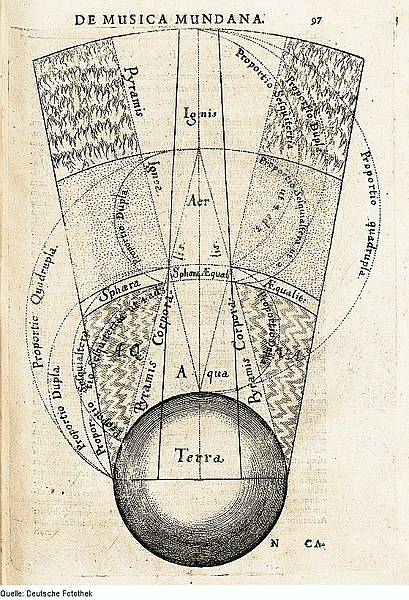

Many pre-modern physical theories postulated a world composed of only two to five elements. The persistence of this thinking into modern times, even unto the age of the Standard Model, is often forgotten, partly because of the modern tendency to disguise the elements with euphemisms. Already in the 1700s, Enlightenment scientists were anxious to distance themselves from alchemy by renaming Fire, as important an element to them as it was to Aristotle or in some cases to Heraclitus; they spoke of "phlogiston", then of "caloric", and finally of "heat". It is thus refreshing to find that one of the greatest of the Eighteenth Century philosophes, writing early in the Long Nineteenth, was willing to call Fire by its old name. Franklin's brief essay is truly astonishing; not only does he explicitly link the New Philosophy to its ancient roots, but also anticipates concepts of entropy lying a hundred years ahead: the role of energy in biology, the intimate link between heat and what he calls the "organization of bodies".
A NEW AND CURIOUS THEORY OF LIGHT AND HEAT ;
in a Letter from
DR. BENJAMIN FRANKLIN
to David Rittenhouse, Esq.
[Transactions of the American Philosophical Society 3,
5 (1793)]
Read June 20, 1788
UNIVERSAL space, as far as we know of it, seems to be filled with a subtil fluid, whose motion, or vibration, is called light.
This fluid may possibly be the same with that which, being attracted by and entering into other more solid matter, dilates the substance, by separating the constituent particles and so rendering some solids fluid, and maintaining the fluidity of others ; of which fluid when our bodies are totally deprived, they are said to be frozen ; when they have a proper quantity, they are in health, and fit to perform all their functions ; it is then called natural heat ; when too much, it is called fever ; and when forced into the body in too great a quantity from without, it gives pain by separating and destroying the flesh, and is then called burning ; and the fluid so entering and acting is called fire.
While organized bodies, animal or vegetable, are augmenting in growth, or are supplying their continual waste, is not this done by attracting and consolidating this fluid called fire, so as to form of it a part of their substance ; and is it not a separation of the parts of such substance, which dissolving its solid state, sets that subtil fluid at liberty, when it again makes its appearance as fire ?
For the power of man relative to matter seems limited to the separating or mixing the various kinds of it, or changing its form and appearance by different compositions of it; but does not extend to the making or creating of new matter, or annihilating the old : -- thus if fire be an original element or kind of matter, its quantity is fixed and permanent in the universe. We cannot destroy any part of it, or make addition to it. We can only separate it from that which confines it, and so set it at liberty (as when we put wood in a situation to be burnt); or transfer it from one solid to another (as when we make lime by burning stone, a part of the fire dislodged from the fuel being left in the stone).
May not this fluid when at liberty be capable of penetrating and entering into all bodies, organized or not: quitting easily in totality those not organized, and quitting easily in part those which are ; the part assumed and fixed remaining till the body is dissolved ?
Is it not this fluid which keeps asunder the particles of air, permitting them to approach, or separating them more in proportion as its quantity is diminished or augmented?
Is it not the greater gravity of the particles of air, which forces the particles of this fluid to mount with the matters to which it is attached as smoke or vapour ?
Does it not seem to have a great affinity with water; since it will quit a solid to unite with that fluid, and go off with it in vapour; leaving the solid cold to the touch, and the degree measurable by the thermometer?
The vapour rises attached to this fluid, but at a certain height they separate, and the vapour descends in rain retaining but little of it, in snow or hail less. What becomes of that fluid ? Does it rise above our atmosphere, and mix with the universal mass of the same kind ?
Or does a spherical shell or stratum of it, denser, as less mixed with air, attracted by this globe, and repelled or pushed up only to a certain height from its surface by the greater weight of air, remain there surrounding the globe and proceeding with it round the sun ?
In such case, as there may be a continuity or communication of this fluid through the air quite down to the earth, is it not by the vibrations given to it by the sun that light appears to us ; and may it not be, that every one of the infinitely small vibrations, striking common matter with a certain force, enters its substance, is held there by attraction, and augmented by succeeding vibrations, till the matter has received as much as their force can drive into it ?
Is it not thus that the surface of this globe is continually heated by such repeated vibrations in the day, and cooled by the escape of the heat when those vibrations are discontinued in the night, or intercepted and reflected by clouds ?
Is it not thus that fire is amassed and makes the greatest part of the substance of combustible bodies ?
Perhaps when this globe was first formed and its original particles took their place at certain distances from the centre in proportion to their greater or less gravity, the fluid fire attracted towards that centre might in great part be obliged, as lighted, to take place above the rest, and thus form the sphere of fire above supposed; which would afterwards be continually diminishing by the substance it afforded to organized bodies, and the quantity restored to it again by the burning or other separating of the parts of those bodies ?
Is not the natural heat of animals thus produced by separating in digestion the parts of food, and setting their fire at liberty ?
Is it not this sphere of fire which kindles the wandering globes that sometimes pass through it in our course round the sun, have their surface kindled by it, and burst when their included air is greatly rarefied by the heat on their burning surface ?
May it not have been from such considerations that the ancient philosophers supposed a sphere of fire to exist above the air of our atmosphere ?
